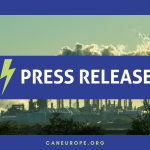MEDIA ADVISORY
On Monday 9 November, the two lead-committees of the European Parliament on the EU recovery fund are set to decide on the scope of the 672,5 billion euro Recovery and Resilience Facility (RRF), and whether or not fossil fuels will be eligible. If the Parliament is serious about achieving ambitious emissions reductions in the next decade, all fossil fuels must be excluded from the fund.
On 9 November, the Budget and Economic and Monetary Affairs committees of the European Parliament will vote on the RRF, taking a position on the controversial fossil fuel exclusion.
Instead of straight fossil fuel exclusions, lawmakers are envisaging a compromise that allows funding for fossil gas under certain circumstances. (1)
Fossil gas is a fuel with substantial CO2 and methane emissions contributing to climate change and its catastrophic impacts. Investing in fossil gas today will result in locking Europe into fossil fuel dependency and carbon-intensive economies for the next decades, in stark contrast to the EU’s Green Deal and climate neutrality goal.
Early October, the European Parliament decided to increase the level of the EU 2030 climate target to 60% emission cuts. Later its Environment Committee showed consistency by agreeing to exclude fossil fuels from the 672,5 billion euro recovery fund to boost the clean transition needed to meet a higher emission reductions target.
Excluding fossil fuels from EU recovery and investing in clean technologies is not only necessary to allow the EU to honour its climate commitments, it also brings far more economic and social benefits. Declining gas demand does not economically justify building new gas infrastructure, and renewables are already cheaper than any fossil fuel in many parts of Europe. The renewable energy sector alone offers three times more job creation potential than fossil fuels.
Ahead of the Committees’ vote on the RRF, Markus Trilling, finance and subsidies policy coordinator at Climate Action Network (CAN) Europe says: “A bad compromise on the fossil fuel exclusion is not acceptable. Any provision must clearly rule out any fossil fuel funding. A greenwashing approach would in contrast harm the credibility of the EU’s Sustainable Finance.”
Esther Bollendorff, EU gas policy coordinator at CAN Europe adds: “For the EU to stick to its commitment under the Paris Agreement, it must phase out fossil gas by 2035 the latest. This will not happen if the recovery fund props up this fossil fuel, locking the EU into carbon and methane intensive emissions that will further wreck the climate for decades to come. If the two committees fail to exclude fossil fuels, the European Parliament’s plenary needs to get the chance to reverse the failure of their ECON/BUDG colleagues.”
ENDS
Notes to editors:
(1) Lawmakers are expected to link the RRF to the Do-No-Harm-Principle of the EU Taxonomy, but unabated use of fossil gas could still comply with thresholds set by the Taxonomy.
Contacts:
Cristina Dascalu, communications coordinator, cristina@caneurope.org
Winnie Wendelin, communications intern, winnie@caneurope.org



